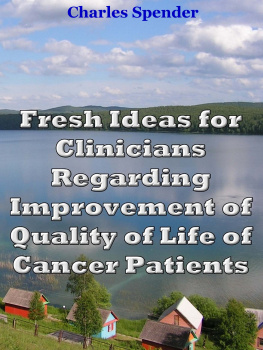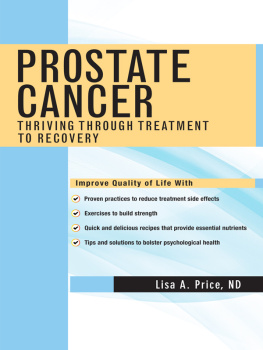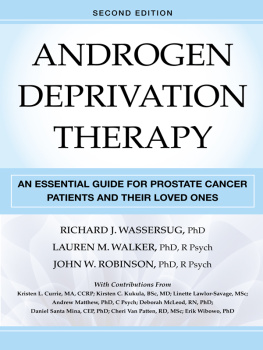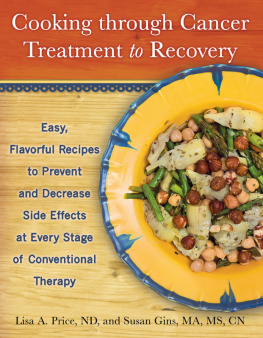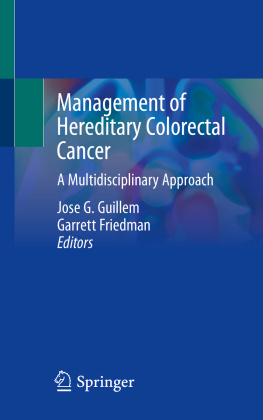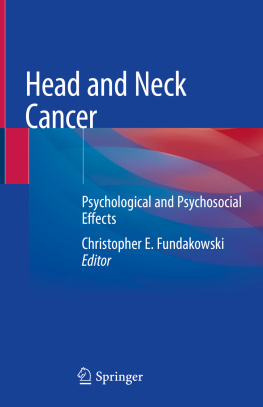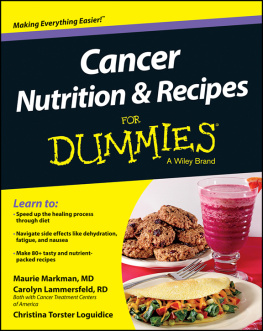Spender - Fresh ideas for clinicians regarding improvement of quality of life of cancer patients
Here you can read online Spender - Fresh ideas for clinicians regarding improvement of quality of life of cancer patients full text of the book (entire story) in english for free. Download pdf and epub, get meaning, cover and reviews about this ebook. year: 2014, genre: Romance novel. Description of the work, (preface) as well as reviews are available. Best literature library LitArk.com created for fans of good reading and offers a wide selection of genres:
Romance novel
Science fiction
Adventure
Detective
Science
History
Home and family
Prose
Art
Politics
Computer
Non-fiction
Religion
Business
Children
Humor
Choose a favorite category and find really read worthwhile books. Enjoy immersion in the world of imagination, feel the emotions of the characters or learn something new for yourself, make an fascinating discovery.
- Book:Fresh ideas for clinicians regarding improvement of quality of life of cancer patients
- Author:
- Genre:
- Year:2014
- Rating:4 / 5
- Favourites:Add to favourites
- Your mark:
- 80
- 1
- 2
- 3
- 4
- 5
Fresh ideas for clinicians regarding improvement of quality of life of cancer patients: summary, description and annotation
We offer to read an annotation, description, summary or preface (depends on what the author of the book "Fresh ideas for clinicians regarding improvement of quality of life of cancer patients" wrote himself). If you haven't found the necessary information about the book — write in the comments, we will try to find it.
Spender: author's other books
Who wrote Fresh ideas for clinicians regarding improvement of quality of life of cancer patients? Find out the surname, the name of the author of the book and a list of all author's works by series.
Fresh ideas for clinicians regarding improvement of quality of life of cancer patients — read online for free the complete book (whole text) full work
Below is the text of the book, divided by pages. System saving the place of the last page read, allows you to conveniently read the book "Fresh ideas for clinicians regarding improvement of quality of life of cancer patients" online for free, without having to search again every time where you left off. Put a bookmark, and you can go to the page where you finished reading at any time.
Font size:
Interval:
Bookmark:
Charles Spender
Distributed by Smashwords
Copyright 2010 Charles Spender
Symptoms of depression, fatigue, pain, and loss of appetite are often associated with cancer and cancer treatments and can significantly worsen quality of life of patients. Interestingly, a number of studies published in the last five decades suggest that brief cooling of the body can reduce pain and fatigue and improve mood and appetite in healthy subjects and in some groups of patients. Possible mechanisms of the analgesic effect include an elevated plasma level of beta-endorphin, the gate control effect of stimulation of thermoreceptors, and distraction from pain. The effects on mood and fatigue could be explained by the reduction of the total brain level of serotonin as well as increased dopaminergic and noradrenergic activity in some brain regions, which may resemble some effects of tianeptine (selective serotonin reuptake enhancer) and dopamine-norepinephrine reuptake inhibitors (bupropion and some psychostimulants). The effect on appetite is most likely mediated by inhibition of cerebral serotonergic activity and changes in plasma levels of leptin, adrenocorticotropic hormone, and thyroid hormones. Repeated moderate cooling (e.g., adapted cold showers) could improve several aspects of quality of life, although the effectiveness of this approach in cancer patients has not been investigated. Moderately cold hydrotherapy is safe for the vast majority of people and may allow a patient to undergo more rounds of chemo-, radiotherapy, and/or surgery because cold hydrotherapy can reduce the side effects of these treatments. Methodological details and potential practical difficulties are discussed in the text.
Patients with cancer often present with symptoms of depression, fatigue, pain, and loss of appetite, with fatigue probably being the most prevalent symptom [].
Estimates for cancer-related fatigue vary: some studies report prevalence of 75% in patients with solid tumors [].
Estimates of prevalence of depressive disorders among cancer patients vary from 10% to 50% in some studies, which may be due to differences in diagnostic criteria used by different investigators and also due to differences in the populations of cancer patients that were selected for analysis [].
Pain is also one of the most common symptoms of cancer [].
Anorexia and the closely related cachexia (wasting syndrome) may be caused by cancer treatments as well as metabolic abnormalities and hormonal changes produced by tumor-host interactions [].
It is not clear how prevalent is co-occurrence of symptoms of fatigue, pain, depression, and anorexia in cancer patients, however a recent study found that prevalence of simultaneous pain, fatigue and depression in community-dwelling adults with a history of cancer is 7.8%, compared with the prevalence of depression at 21%, pain at 33% and fatigue at 25% in this segment of population [].
Interestingly, literature suggests that temporary moderate cooling of the body may have beneficial effects on fatigue [] in healthy subjects and some groups of patients. Although it is unlikely that a single protocol will be equally effective at improving all of these aspects of quality of life (somewhat different approaches may be required for each domain), it is quite intriguing that body cooling may have several beneficial effects on quality of life, in principle. It should be noted that randomized controlled trials are lacking and the current level of evidence is relatively weak. This paper presents an overview of each of these effects and the following sections will discuss the existing empirical evidence as well as possible physiological mechanisms. The empirical evidence is presented first and the biological mechanisms are discussed in a separate section towards the end of the article. A discussion of potential adverse effects is also provided.
Some of the first studies of the effects of body cooling on fatigue appeared in the 1960s []. The winter swimming group included patients with fibromyalgia and rheumatoid arthritis, the disorders that are often associated with fatigue. Although this Finnish study did not report adverse effects of winter swimming among the participants, this procedure should be used with extreme caution because it can quickly cause hypothermia and the associated adverse effects on health as discussed in more detail in the section Potential adverse effects below.
Interestingly, there are several reports showing that body cooling during exercise or between exercise bouts can improve athletic performance [].
Local application of cold is a fairly well known analgesic modality [].
Additionally, numerous experiments on laboratory animals conducted in the last 3 decades have shown that a brief cold-water swim causes substantial antinociception [].
Chronic and intermittent exposure to cold have been shown to increase food intake in homeothermic animals, which is thought to be related to increased energy expenditure (upregulation of heat production in order to maintain normal body temperature) []. It is possible that the slight weight gain rather than weight loss is observed with brief repeated exposure to cold because this approach does not significantly increase average metabolic rate (and energy expenditure), but it may produce sufficient neurohormonal changes that will stimulate appetite.
Several studies have shown that brief cooling of the body can improve mood in healthy people and in some groups of patients [].
To date, there have been no statistically significant clinical trials of cold water treatments as monotherapy for depression, but a recent paper out of Poland showed that addition of cryotherapy to pharmacological treatments significantly reduced depressive symptoms in a group of 26 patients with depressive and anxiety disorders (ICD-10) [].
In summary, these studies suggest that temporary cooling of the body can improve mood in healthy people and addition of this modality to pharmacotherapy may be beneficial for patients diagnosed with depression. Many of the aforementioned studies reported elevation of normal mood (euphoriant effect), which is not the same as the antidepressant effect or normalization of depressed mood. Although the great majority of antidepressant drugs do not have euphoriant properties [].
It is worth mentioning that this author developed an antidepressant diet, which may potentially serve as a fast-acting antidepressant treatment. The diet consists of pasteurized milk and/or cultured milk, unsalted unprocessed cheese, fruits, vegetables and raw water extract of wheat. This diet excludes everything else, particularly, food additives, dietary supplements, junk food, seasonings and spices. The proposed antidepressant diet has not been tested in clinical trials, but this authors personal experience suggests that it can improve internal mood, when it is depressed, within several days. (I have never been diagnosed with depression). The theoretical argumentation and more details on practical application of this approach can be found in the book How to Become Smarter.
In brief, there is substantial evidence that the ancestral diet of hominids (over 300 thousand years ago) was a raw diet devoid of any artificial chemicals. This diet was similar to the diet of modern chimpanzees and most likely consisted of raw meat and raw plant foods. Therefore, it is possible that the human brain will function at its best on this kind of diet, both in terms of psychological well-being and in terms of cognitive performance. This is because the human brain had evolved on this kind of diet for millions of years before the mastery of cooking and before the introduction of various artificial ingredients into the diet. These are relatively recent innovations in terms of evolution and the human brain may not be fully adapted to the diet that is predominantly cooked and chockfull of artificial chemicals.
Font size:
Interval:
Bookmark:
Similar books «Fresh ideas for clinicians regarding improvement of quality of life of cancer patients»
Look at similar books to Fresh ideas for clinicians regarding improvement of quality of life of cancer patients. We have selected literature similar in name and meaning in the hope of providing readers with more options to find new, interesting, not yet read works.
Discussion, reviews of the book Fresh ideas for clinicians regarding improvement of quality of life of cancer patients and just readers' own opinions. Leave your comments, write what you think about the work, its meaning or the main characters. Specify what exactly you liked and what you didn't like, and why you think so.

